|
De Vlaamse dichter Guido Gezelle werd geboren in Brugge op 1 mei 1830. Zie ook mijn blog van 1 mei 2010 en verder alle tags voor Guido Gezelle.
Een dreupel poësij
Aan Gustaf Verriest
Hoe blij is de arme vogel toen
hij, lange lang geboeid,
weerom zijn vlerk mag opendoen
en in de hemel roeit!
En hoe is 't arme viske blij,
dat, in mijn net gepakt,
half dood gesperteld, los van mij,
weerom in 't water smakt!
Het gouden vliegsk' hoe blijde ruist
het, werk- en worstelensmoe,
wanneer ik zijn gevang, mijn vuist,
ontluikend opendoe!
Zo blij en is mijn ziele niet,
maar zeven maal zo blij,
wanneer ik, moe en mat, geniet
een dreupel poësij. -
In 't vrij bewind des vogels en
in 't koele ruim daarvan,
en 'k weet niet waar ik nog al ben
wanneer ik dichten kan:
't gedacht springt als de vis, die zeer
in 't waterkrystalijn
blank blinkt en weerom blinkt, aleer
'k hem wel gewaar kan zijn;
bepereld als het vliegske, licht
en schitterend in de zon,
zo vliegt en lacht het los gedicht
met zijne Dichter ton:
neen, blij en is mijn ziel toen niet,
maar is iets meer als blij,
wanneer zij, God zij dank, geniet
een dreupelke poësij!
Spreeuwen
„’k Zie-’t!” zo vliggert, vlug te vlerke,
recht de torre in van de kerke,
daar ze is nest aan ’t bouwen!... „’k zie-’t!”
piept de spreeuwe, en anders niet.
Maar wat is mij, scherpgebekte,
zwart-halfgroen gevliggervlerkte,
vage vogel, dan ’t bedied
van uw eeuwig zeggen: „’k zie-’t!”
Ziet gij, daar omhoog aan ’t broeden,
ziet ge, aan ’t blijde jongskes voeden,
in uw pierende oogskes, iet
dat elk mense niet en ziet?
Zeg, of is ’t de zonne rijzen,
dat gij ziet, is ’t buien bijzen;
kwade wichten of kwa died
zitten ievers, diepe in ’t riet?
„’k Zie-’t!” zo piept gij; ziet gij, binnen
deze borst, mij iet beminnen,
haten, willen, wensen iet,
blijdschap hebben en verdriet?
„’k Zie-’t!” uw roepwoord doet mij delven
diepe in ’t diepste diep mijns zelven,
en ontdekken daar ’t bedied
van uw eeuwig zeggen „’k zie-’t!”
Een daar is, die aan de leeuwen
’t leven gaf, en aan de spreeuwen,
Een die, vrij van al ’t verdriet,
hoge zit en verre ziet.
Een... Hij zit in zijnen torre,
zonder schaaltje en zonder schorre;
en, van ’t gene in mij geschiedt,
Hij mag eeuwig zeggen: „’k zie-’t!”
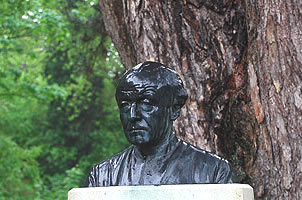
Guido Gezelle (1 mei 1830 – 27 november 1899)
Borstbeeld in Brugge
De Duitse dichter en schrijver Johano Strasser werd geboren op 1 mei 1939 in Leeuwarden. Zie ook alle tags voor Johano Strasser op dit blog.
Zeiten gabs Zeiten
Für Flori, der jetzt auch schon 50 ist
Ganze Herden von indischen Elefanten
Haben wir in Atzes Porzellanladen gelockt
Bloß so zum Spaß
Kinder Kinder! Ist das denn nötig?
Wo soll ich denn jetzt mit den Scherben hin
Und mit den plattgetretenen Kunden?
Zeiten gabs
Da löste sich alles von selbst
Aber dann kamen andere Zeiten
Ich zum Beispiel
Das letzte Mal
Daß eine Frau sich nach mir umdrehte
War siebzehnhundertundzweiundneunzig
(Kann auch drei Jahre früher gewesen sein)
Schwupp! Bist du draußen bei den Hunden
Die haben zwar Respekt vor deiner Bildung
Aber so richtig von innen begreifen
Tun sie dich nicht
Eines Morgens die Nachricht: Die Dämme sind
Alle auf einmal unterspült
Wo bleiben die Dichter?
Hatten sie nicht für den Fall des Falles
Hilfe versprochen?
Drunt in der grünen Au
Steht ein Birnbaum schön blau
Zweig am Ast Ast am Baum schaukeln im Wind
Von der Vogelweyde Klopstock
Rühmkorf und ich
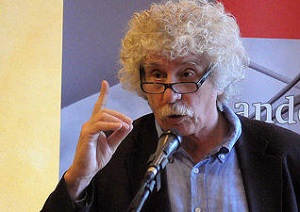
Johano Strasser (Leeuwarden, 1 mei 1939)
De Franse schrijfster Yasmina Reza werd geboren op 1 mei 1960 in Parijs. Zie ook alle tags voor Yasmina Reza op dit blog.
Uit: Heureux les heureux
« On faisait les courses pour le week-end au supermarché. À un moment, elle a dit, va faire la queue pour le fromage pendant que je m’occupe de l’épicerie. Quand je suis revenu, le caddie était à moitié rempli de céréales, de biscuits, de sachets alimentaires en poudre et autres crèmes de dessert, j’ai dit, à quoi ça sert tout ça ? – Comment à quoi ça sert ? J’ai dit, à quoi ça rime tout ça ? Tu as des enfants Robert, ils aiment les Cruesli, ils aiment les Napolitains, les Kinder Bueno ils adorent, elle me présentait les paquets, j’ai dit, c’est absurde de les gaver de sucre et de gras, c’est absurde ce caddie, elle a dit, tu as acheté quels fromages ? – Un crottin de Chavignol et un morbier. Elle a crié, et pas de gruyère ? – J’ai oublié et je n’y retourne pas, il y a trop de monde. – Si tu ne dois acheter qu’un seul fromage, tu sais très bien que tu dois acheter du gruyère, qui mange du morbier à la maison ? Qui ? Moi, j’ai dit. – Depuis quand tu manges du morbier ? Qui veut manger du morbier ? J’ai dit, arrête Odile. – Qui aime cette merde de morbier ? ! Sous-entendu « à part ta mère », dernièrement ma mère avait trouvé un écrou dans un morbier, j’ai dit, tu hurles Odile. Elle a brutalisé le caddie et y a jeté trois tablettes groupées de Milka au lait. J’ai pris les tablettes et les ai remises dans le rayon. Elle les a remises encore plus vite dans le caddie. J’ai dit, je me tire. Elle a répondu, mais tire-toi, tire-toi, tu ne sais dire que je me tire, c’est ta seule réponse, dès que tu es à court d’arguments tu dis je me tire, il y a tout de suite cette menace grotesque. C’est vrai que je dis souvent je me tire, je reconnais que je le dis, mais je ne vois pas comment je pourrais ne pas le dire, quand c’est la seule envie qui me vient, quand je ne vois pas d’autre issue que la désertion immédiate, mais je reconnais aussi que je le profère sous forme, oui, d’ultimatum. Bon, tu as fini tes courses, je dis à Odile en poussant d’un coup sec le caddie vers l’avant, on n’a plus d’autres conneries à acheter ? »
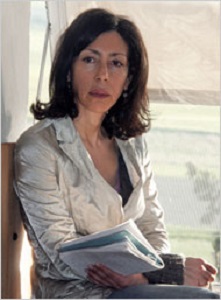
Yasmina Reza (Parijs, 1 mei 1960)
De Amerikaanse schrijver Joseph Heller werd geboren in New York op 1 mei 1923. Zie ook alle tags voor Joseph Heller op dit blog.
Uit: Catch 22
“He swam languorously out to the raft, held on a moment, and swam languorously back to where he could stand on the sand bar. He submerged himself head first into the green water several times until he felt clean and wide-awake and then stretched himself out face down in the sand and slept until the planes returning from Bologna were almost overhead and the great, cumulative rumble of their many engines came crashing in through his slumber in an earth-shattering roar.
He woke up blinking with a slight pain in his head and opened his eyes upon a world boiling in chaos in which everything was in proper order. He gasped in utter amazement at the fantastic sight of the twelve flights of planes organized calmly into exact formation. The scene was too unexpected to be true. There were no planes spurting ahead with wounded, none lagging behind with damage. No distress flares smoked in the sky. No ship was missing but his own. For an instant he was paralyzed with a sensation of madness. Then he understood, and almost wept at the irony. The explanation was simple: clouds had covered the target before the planes could bomb it, and the mission to Bologna was still to be flown.
He was wrong. There had been no clouds. Bologna had been bombed. Bologna was a milk run. There had been no flak there at all.
Captain Piltchard and Captain Wren, the inoffensive joint squadron operations officers, were both mild, soft-spoken men of less than middle height who enjoyed flying combat missions and begged nothing more of life and Colonel Cathcart than the opportunity to continue flying them. They had flown hundreds of combat missions and wanted to fly hundreds more. They assigned themselves to every one. Nothing so wonderful as war had ever happened to them before; and they were afraid it might never happen to them again. They conducted their duties humbly and reticently, with a minimum of fuss, and went to great lengths not to antagonize anyone. They smiled quickly at everyone they passed. When they spoke, they mumbled. They were shifty, cheerful, subservient men who were comfortable only with each other and never met anyone else’s eye, not even Yossarian’s eye at the open-air meeting they called to reprimand him publicly for making Kid Sampson turn back from the mission to Bologna.”
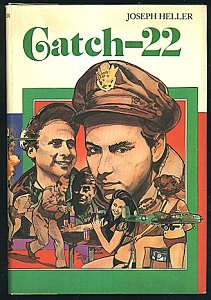
Joseph Heller (1 mei 1923 – 12 december 1999)
Cover
De Nieuwgriekse dichter Yánnis Rítsos werd geboren op 1 mei 1909 in Monemvasia. Zie ook mijn blog van 1 mei 2010 en verder alle tags voor Yánnis Rítsos.
Moonlight Sonata (Fragment)
We’ll sit for a little on the low wall, up on the hill,
and as the spring breeze blows around us
perhaps we’ll even imagine that we are flying,
because, often, and now especially, I hear the sound of my own dress
like the sound of two powerful wings opening and closing,
you feel the tight mesh of your throat, your ribs, your flesh,
and when you enclose yourself within the sound of that flight
you feel the tight mesh of your throat, your birds, your flesh,
and thus constricted amid the muscles of the azure air,
amid the strong nerves of the heavens,
it makes no difference whether you go or return
it makes no difference whether you go or return
and it makes no difference that my hair has turned white
(that is not my sorrow – my sorrow is
that my heart too does not turn white).
Let me come with you.
I know that each one of us travels to love alone,
alone to faith and to death.
I know it. I’ve tried it. It doesn’t help.
Let me come with you.
This house is haunted, it preys on me –
what I mean is, it has aged a great deal, the nails are working loose,
the portraits drop as though plunging into the void,
the plaster falls without a sound
as the dead man’s hat falls from the peg in the dark hallway
as the worn woolen glove falls from the knee of silence
or as moonbeam falls on the old, gutted armchair.
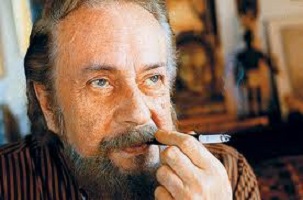
Yánnis Rítsos (1 mei 1909 — 11 november 1990)
De Italiaanse schrijver Ignazio Silone werd geboren op 1 mei 1900 in Pescina dei Marsi. Zie ook mijn blog van 1 mei 2010 en verder de tags voor Ignazio Silone.
Uit: Bread And Wine (Vertaald door Luigi Barzini)
“Don’t be fooled by appearances,” said Pietro. “The strength of a dictatorship is muscular, not spiritual.”
“You’re right,” said Uliva. “There’s something cadaverous about it. It hasn’t been a movement for a long time, not even a Vendee-type movement, but just a bureaucracy. But what sort of opposition is there? What are you? A future bureaucracy. You aspire to totalitarian power, too, but in the name of different ideas, which means just different words, and for different interests. If you people win and probably you’ll be unlucky enough to win, we’ll just go from one tyranny to another.”
“You live on hallucinations,” said Pietro, “How can you condemn the future?”
“Our future is other countries’ pasts,” said Uliva. “Yes, I don’t deny that they’ll be technical and economic changes. Just as now we have state railway and the state quinine, salt, matches and tobacco, so then we’ll have state bread, state peas and potatoes. Will that be technical progress? Let’s admit that it would be. But this technical progress will be an opening wedge for a compulsory official doctrine, for a totalitarian orthodoxy which will use all means, from the movies to terrorism, to stamp out any heresy and tyrannize individual thought. The present black inquisition will be followed by a red inquisition. There’ll be red censorship instead of the present one, and red deportations will take the place of the ones we have now – and the most favored victims will be dissident revolutionaries. In the same way, just as the present bureaucracy identifies itself the fatherland and exterminates every opponent, denouncing him as a hireling of the foreigners, your future bureaucracy will identify itself with labor and Socialism and will persecute anyone who continues to think with his own head as a prized agent of big landowners and the industrialists.”
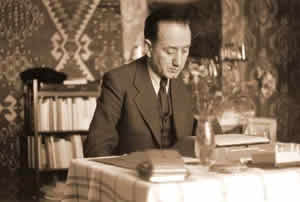
Ignazio Silone (1 mei 1900 – 22 augustus 1978)
Zie voor nog meer schrijvers van de 1e mei ook mijn blog van 1 mei 2011 deel 2 en ook deel 3.
01-05-2015 om 18:53
geschreven door Romenu 
Tags:Guido Gezelle, Johano Strasser, Yasmina Reza, Joseph Heller, Yánnis Rítsos, Ignazio Silone, Romenu
|

